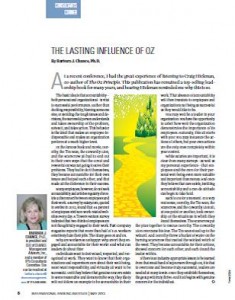At a recent conference, I had the great experience of listening to Craig Hickman, co-author of The Oz Principle. This publication has remained a top-selling leadership book for many years, and hearing Hickman reminded me why this is so.
The basic idea is that accountability—both personal and organizational—is vital to successful performance. Rather than ducking responsibility, blaming someone else, or avoiding the tough issues and decisions, the successful person understands and takes ownership of the problem, solves it, and takes action. This behavior is the kind that makes an employee indispensable and makes an organization perform at a much higher level.
In the famous book and movie, Dorothy, the Tin Man, the Cowardly Lion, and the Scarecrow all had to find out in their own ways that the Great and Powerful Oz was not going to solve their problems. They had to do it themselves; they became accountable for their own issues and helped each other, and that made all the difference in their success.
Many employees, however, do not seek accountability, and articles regularly chronicle a disconnect between employees and their work. A survey by Salary.com, quoted in Forbes in 2012, found that 64 percent of employees visit non-work-related websites every day. A Towers Watson survey indicated that two-thirds of employees are not thoughtfully engaged in their work. Fast Company magazine reports that more than half of U.S. workers effectively hate their jobs. The litany goes on and on.
Why are workers so unhappy? Why aren’t they engaged and accountable for their work? And what can leaders do about this?
Individuals want to feel valued, respected, and recognized at work. They want to know that their organizations and supervisors care about their well-being. Most want responsibility, and virtually all want to be successful. Until they believe that genuine concern exists in some reasonable and demonstrable way, they likely will not follow an example to be accountable in their work. That absence of accountability will then translate to employees and organizations not being as successful as they would like to be.
You may well be a leader in your organization. You have the opportunity to affect how well the organization demonstrates the importance of its employees. Naturally, this all starts with you! You may influence the actions of others, but your own actions are the only ones completely within your control.
While salaries are important, it is clear from many surveys—as well as my personal experience—that employees find the care for their personal well-being even more valuable and important than money. And once they believe that care exists, instilling accountability and a can-do attitude can begin to take hold.
Back to Oz for a moment. In a very real sense, Dorothy, the Tin Man, the Scarecrow, and the Cowardly Lion all, at one point or another, took ownership of the situations in which they found themselves. The Scarecrow put the plan together to rescue Dorothy. The Cowardly Lion overcame his fear. The Tin Man stood up to the Wizard. And Dorothy threw a bucket of water on the burning Scarecrow that melted the Wicked Witch of the West. They became accountable for their actions, showed concern for each other, and each found the leader within.
If there is an industry-appropriate lesson to be learned from that small band of sojourners through Oz, it is that to overcome and become truly successful, leaders are needed at many levels. Once they establish themselves, the group will truly thrive. And it all begins with genuine concern for the individual.
Barbara J. Chance, Ph.D., is president and CEO of CHANCE Management Advisors, Inc., and a member of IPI’s Consultants Committee. She can be reached at barbara.chance@chancemanagement.com or 215.564.6464.
TPP-2013-05-The Lasting Influence of Oz

